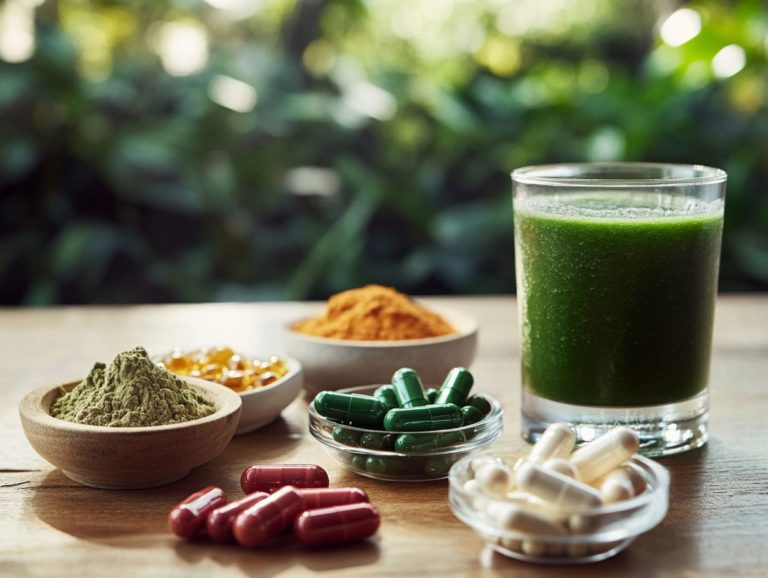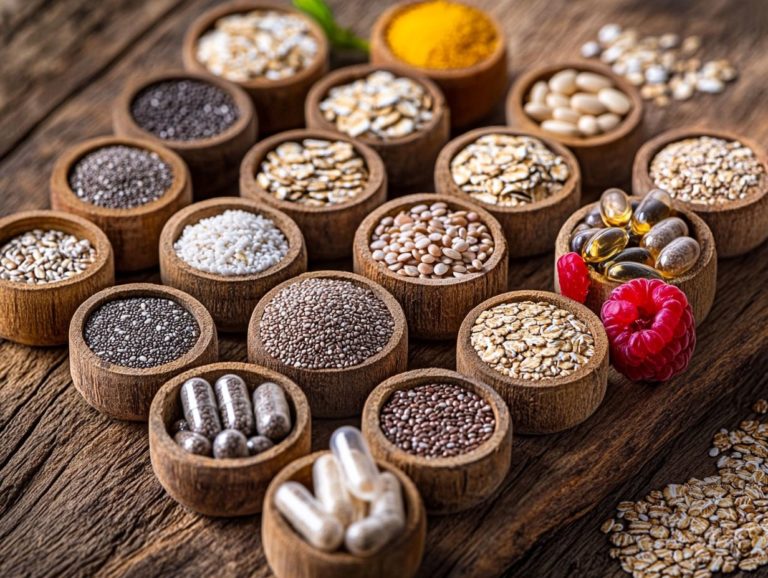Choosing the Right Protein Powder: A Guide
Protein powder has become a staple for fitness enthusiasts and health-conscious individuals seeking convenience in their supplement plan.
With so many options available from whey to soy it s easy to feel overwhelmed when trying to find the perfect fit for your needs. Dive into this guide and discover how to unlock your potential with the right protein powder!
This guide is designed to help you navigate the protein powder landscape. You will explore the various types, how to select the right one based on your goals, understand nutrition labels, and learn effective strategies for seamlessly incorporating them into your diet.
Whether your aim is to lose weight or build muscle, this article also offers insights to help you make informed and confident decisions.
Contents
Key Takeaways:

- Determine your goals and needs before choosing a protein powder. Consider factors such as dietary restrictions and desired results to find the right fit for you.
- Read nutrition labels and ingredients carefully to ensure you are getting the necessary nutrients and avoiding additives that may not align with your goals or dietary needs.
- For weight loss or muscle building, incorporate protein powder into your diet strategically. Follow recommended dosages for optimal results and consult a healthcare professional for personalized recommendations.
Understanding Protein Powder
Grasping the nuances of protein powder is vital for anyone embarking on a fitness journey. It can significantly influence your motivation and ability to achieve health goals. With the right insights, you can expertly navigate the diverse landscape of protein powders, ensuring you choose options that align seamlessly with your dietary preferences be it whey protein for building muscle or soy protein for accommodating dietary restrictions.
These supplements enhance your exercise performance, support muscle recovery, and enrich your overall nutritional intake.
What is Protein Powder?
Protein powder is a premium dietary supplement crafted from high-quality protein sources. It is designed to elevate your protein intake and support either muscle growth or weight loss.
This versatile powder is often the go-to choice for athletes and fitness enthusiasts. It serves as a convenient meal replacement or a vital ingredient in recovery shakes. By incorporating it into your balanced diet, you can effortlessly meet your daily protein requirements, especially if you find it challenging to get enough through whole foods alone.
There are a variety of protein types available to suit your needs, including:
- Whey
- Casein
- Soy
- Pea protein
Each option presents unique benefits and caters to various dietary preferences. Whether your goal is to bulk up, slim down, or maintain your overall health, integrating protein powder into your regimen can be a highly effective strategy.
Types of Protein Powder
You ll find a diverse array of protein powders available on the market today, including whey protein, soy protein, and casein.
Each type is designed to cater to various fitness goals and dietary preferences. This ensures you can select the one that aligns perfectly with your needs.
Whey, Casein, Soy, and More
Whey protein, casein, and soy protein stand out among the plethora of protein powders. Each brings unique benefits for muscle recovery and overall wellness.
Whey protein, extracted from milk during the cheese-making process, is renowned for its rapid absorption rate. This makes it an excellent choice for post-workout recovery, as it swiftly delivers essential amino acids the building blocks of proteins to your repairing muscles.
On the flip side, casein protein, also derived from milk, takes a slower path through digestion. This sustained release of amino acids is particularly advantageous for those aiming to support muscle synthesis overnight or during long stretches without food.
Then there’s soy protein a plant-based alternative that caters to vegans and vegetarians. Rich in essential amino acids, it also offers heart health benefits.
Each type of protein presents distinct advantages with varying absorption rates. This allows you to tailor your dietary choices to align perfectly with your personal fitness goals, enhancing your workout performance and recovery.
How to Choose the Right Protein Powder

Selecting the ideal protein powder requires thoughtful consideration of your fitness goals, dietary preferences, and specific protein needs. This mindful approach ensures that you choose a supplement that truly supports your overall health journey.
Determining Your Goals and Needs
To effectively choose a protein powder, first determine your fitness goals, whether they involve weight loss, muscle mass gain, or overall health improvement.
By clearly identifying these objectives, you can set achievable benchmarks that will guide both your dietary choices and exercise routines.
For instance, if your aim is to build muscle, you might gravitate toward protein powders that boast higher protein content and specific amino acids known to support muscle recovery. Conversely, if weight loss is your focus, you may opt for a lower-calorie protein source that includes added fiber to help you feel fuller longer.
Consulting with health professionals or dietitians can provide personalized advice tailored to your unique needs, ensuring that the protein powder you select aligns seamlessly with your exercise regimen and desired outcomes.
Considerations for Dietary Restrictions
When selecting a protein powder, it’s crucial to consider your dietary restrictions, such as lactose intolerance or a preference for plant-based options.
Choosing the right protein powder significantly impacts your health and fitness journey!
If you’re lactose intolerant, traditional whey protein might not be ideal. Instead, explore alternatives like soy protein, which accommodates your dairy restrictions and offers a complete amino acid profile the building blocks of protein that your body cannot produce on its own key for muscle repair and growth.
Plant-based options, such as pea or brown rice protein, deliver solid nutrition while being gentle on the digestive system. Just remember to assess the protein quality of these options; some plant sources may need to be paired together to ensure you’re getting all the essential amino acids your body needs for optimal health.
Reading Nutrition Labels and Ingredients
Reading nutrition labels and ingredients on protein powder packaging is essential for understanding protein content and vital nutrients. This knowledge gives you the power to make informed choices that align seamlessly with your health goals.
Key Nutrients and Additives to Look For
Key nutrients and additives in protein powders can influence your diet, enhance protein absorption, and elevate overall health benefits.
Understanding what to seek in these supplements is vital for optimizing your health. Essential nutrients like vitamins B6 and B12 support energy metabolism, while minerals such as magnesium and potassium are crucial for muscle function and recovery.
Antioxidants in some protein powders can help fight oxidative stress, an imbalance between free radicals and antioxidants in your body, promoting better overall wellness.
It’s equally important to remain vigilant about common additives, like artificial sweeteners, which can lead to digestive discomfort or unwanted cravings. Opting for natural flavorings or plant-based ingredients can significantly enhance health benefits without the drawbacks often associated with synthetic components.
Using Protein Powder for Weight Loss or Muscle Building

Utilizing protein powder with intention can effectively support your weight loss and muscle-building objectives.
By seamlessly incorporating protein shakes into your daily diet and workout routine, you create a powerful ally in your fitness journey.
Strategies for Incorporating Protein Powder into Your Diet
Incorporating protein powder into your diet can be achieved through various strategies tailored to your preferences, whether that means meal replacements or innovative recipes.
Transform smoothies into nutrient-dense snacks by blending your favorite fruits, leafy greens, and a scoop of protein powder. This results in a deliciously fulfilling treat. If savory options are more your style, whip up protein-rich snacks like homemade energy bars or cookies. You can easily swap ingredients for healthier alternatives without sacrificing flavor.
Don’t hesitate to try adding protein powder to oatmeal, pancakes, or yogurt. This effortlessly elevates your meals. Staying motivated on your fitness journey is crucial; set small, achievable goals and celebrate your successes to keep focused and energized.
Recommended Dosages for Different Goals
Recommended dosages for protein powder can vary based on your individual goals. Specific guidelines enhance exercise performance and support muscle recovery.
- If you’re aiming to shed weight, increase protein intake to promote a feeling of fullness, which helps control appetite. Aim for 1.2 to 1.6 grams of protein per kilogram of body weight daily.
- If your focus is on building muscle, ramp up to 1.6 to 2.2 grams per kilogram, depending on your activity level and workout intensity.
Consider any dietary restrictions you may have. Plant-based protein sources proteins derived from plants like beans and peas can be effective when balanced correctly, ensuring you receive all essential amino acids.
Frequently Asked Questions
What is protein powder and why do I need it?
Protein powder is a quick way to get protein, derived from animal or plant sources. It is often used by athletes and fitness enthusiasts to support muscle growth and repair. This supplement can also help increase protein intake for those with busy lifestyles or specific dietary needs.
How do I know which protein powder is right for me?

Choosing the right protein powder depends on your goals, preferences, and dietary restrictions. Whey protein is popular for muscle building, while plant-based powders like pea or soy protein are great for vegetarians and vegans. Read labels and consider protein source, ingredients, and added sugars before making a decision.
Can I use protein powder for weight loss?
Protein powder can be a helpful tool for weight loss, as it helps you feel full and satisfied, potentially reducing calorie intake. Use it alongside a balanced diet and regular exercise for the best results. Choose a protein powder with minimal added sugars and carbohydrates for weight loss.
When is the best time to take protein powder?
The best time to take protein powder is after a workout, as your body needs protein to repair and build muscle. It can also be a meal replacement or snack throughout the day. Remember, protein powder should complement whole food sources of protein in your diet.
What should I look for on the label of protein powder?
When choosing a protein powder, look for high protein per serving and minimal added sugars and artificial ingredients. Check for allergens or ingredients that may not align with your dietary needs.
Is it safe to take protein powder every day?
You can safely take protein powder every day as long as you follow the recommended serving size and don t exceed your daily protein needs. It s always wise to consult with a healthcare professional before starting any new supplement regimen.
For personalized advice, consider consulting a nutritionist to help you choose the right protein powder for your needs.






